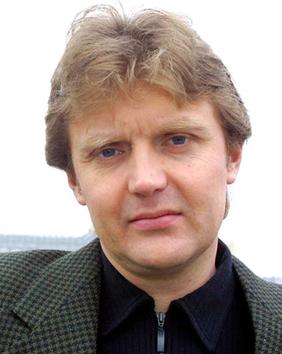Alexander Litvinenko facts for kids
Quick facts for kids Alexander LitvinenkoАлександр Литvinenko |
|
|---|---|

Litvinenko in 2002
|
|
| Allegiance | |
| Service | KGB/FSB (defected) MI6 |
|
|
|
| Birth name | Aleksandr Valterovich Litvinenko |
| Born | 30 August 1962 or 4 December 1962 Voronezh, Russian SFSR, Soviet Union |
| Died | 23 November 2006 (aged 43 or 44) Bloomsbury, London, England |
| Cause of death |
Radiation poisoning (murder) |
| Nationality | Soviet Union (1962–1991) Russian Federation (1991–2006) United Kingdom (2006–his death) |
| Spouse |
Nataliya
(m. 1981; div. 1994)Marina
(m. 1994–2006) |
| Children |
|
Alexander Valterovich Litvinenko (born August 30, 1962, or December 4, 1962 – died November 23, 2006) was a Russian man who later became a British citizen. He used to be an officer in the Russian secret service, the FSB, where he worked to fight organized crime.
In November 1998, Litvinenko and other FSB officers publicly said that their bosses told them to kill a rich Russian businessman, Boris Berezovsky. Litvinenko was arrested in March 1999 for using his power wrongly. He was found not guilty in November 1999 but was arrested again. The charges were dropped again in 2000.
He then moved with his family to London and was given protection in the United Kingdom. In London, he worked as a journalist and writer, and also helped British spy agencies.
During his time in London, Litvinenko wrote two books: Blowing Up Russia: Terror from Within and Lubyanka Criminal Group. In these books, he claimed that Russian secret services caused explosions in apartments and other terror attacks. He said this was done to help Vladimir Putin become powerful. He also said that Putin ordered the killing of a Russian journalist, Anna Politkovskaya, in October 2006.
On November 1, 2006, Litvinenko suddenly got very sick and was taken to the hospital. It was found that he was poisoned by a radioactive substance called polonium-210. He died from the poisoning on November 23, becoming the first person known to die from this type of radiation sickness. News of his death spread worldwide, and many believed the Russian government was responsible.
Before he died, Litvinenko said: "You may succeed in silencing one man but the howl of protest from around the world, Mr. Putin, will reverberate in your ears for the rest of your life." The day after Litvinenko's death, Putin publicly stated: "Mr Litvinenko is, unfortunately, not Lazarus".
Contents
What is Polonium-210?
Polonium-210 is a special kind of radioactive material. Unlike many other radioactive sources, it only releases tiny particles called alpha particles. These particles are very weak. They cannot even go through a piece of paper or human skin.
This means that regular radiation detectors cannot find them. Hospitals usually have equipment to find stronger radiation like gamma rays, but not alpha particles. Both alpha particles and gamma rays are types of ionizing radiation. This kind of radiation can cause radiation sickness.
An alpha-emitting substance like polonium-210 can only harm you if you swallow it (like in food or drink) or breathe it in. Once inside the body, it acts like a short-range weapon, damaging living cells nearby. Litvinenko was tested for alpha-emitters using special equipment just hours before he died.
His Burial and Investigation
On December 7, 2006, Litvinenko was buried at Highgate Cemetery in London. His funeral followed Muslim traditions, including a Muslim prayer led by an imam. After the funeral, there was a private memorial. At this event, a music group called Tonus Peregrinus sang religious music by Russian composers like Igor Stravinsky and Sergei Rachmaninov. They also sang three songs by British composer Antony Pitts.
The events leading to Litvinenko's death caused a lot of debate. Many theories about his poisoning and death started. A British investigation into the murder pointed to Andrey Lugovoy as the main suspect. Lugovoy was a former member of Russia's Federal Protective Service.
The United Kingdom asked Russia to send Lugovoy to Britain for trial. However, the Constitution of Russia does not allow Russian citizens to be sent to other countries for trial. Russia refused to send him, which caused problems in the relationship between Russia and the United Kingdom.
The Public Inquiry
After Litvinenko's death, his wife, Marina Litvinenko, started a campaign with the help of a biologist named Alexander Goldfarb. They worked through the Litvinenko Justice Foundation. In October 2011, Marina won the right to have an official investigation, called an inquest, into her husband's death in London. This investigation was delayed many times because of issues with evidence.
A larger public investigation began on January 27, 2015. It finished in January 2016. The investigation concluded that Litvinenko's murder was an operation carried out by the FSB. It also said that the murder was probably approved by Vladimir Putin and Nikolai Patrushev. At that time, Patrushev was the Director of the FSB.
Related pages
Images for kids
-
The report stated that the FSB operation to kill Litvinenko was probably approved by Nikolai Patrushev (left) and Vladimir Putin
See also
 In Spanish: Aleksandr Litvinenko para niños
In Spanish: Aleksandr Litvinenko para niños
 | Isaac Myers |
 | D. Hamilton Jackson |
 | A. Philip Randolph |





